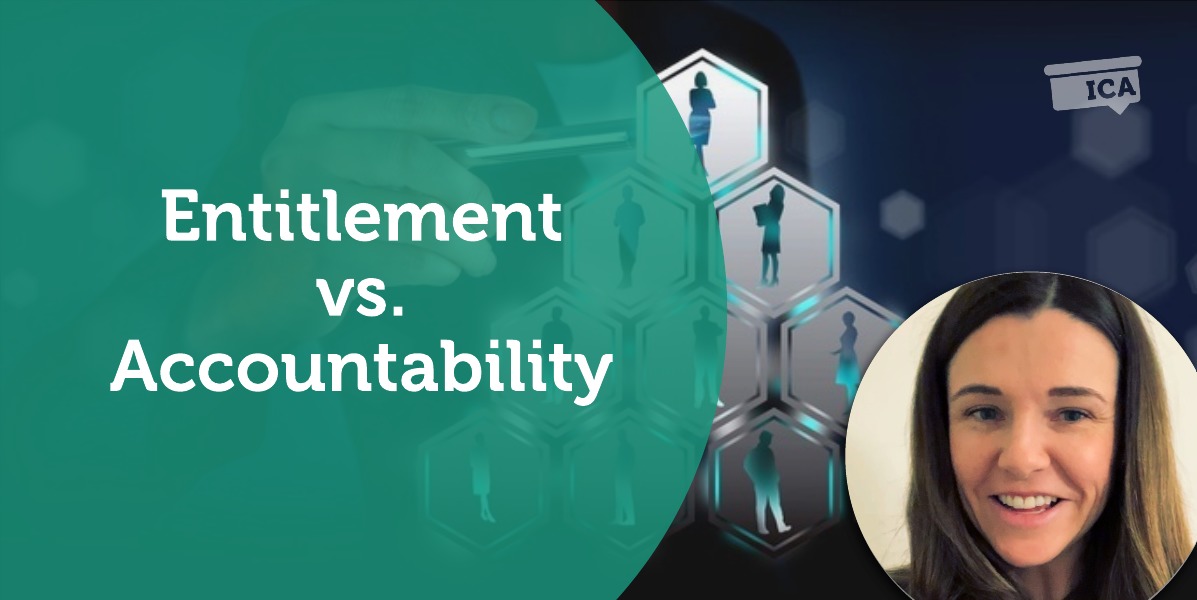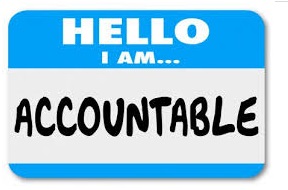 A Coaching Power Tool Created by Cara Amores
A Coaching Power Tool Created by Cara Amores
(Leadership Coach, UNITED STATES)
 Introduction:
Introduction:
We all want to reach our potential, to achieve success, to reach our dream goals. There is nothing wrong with that. But high expectations must be balanced with a sense of accountability for our actions, a sense of responsibility for ourselves. Without this sense of accountability, we have a lack of self-control and lack of ability to see our place within a community of people. To quote author Karen Deerwester who has studied entitled children with a “you owe me” attitude, the problem comes from “entitlement without responsibility”[1]. Taking accountability for our own decisions, our skill levels, our actions, our words, is the behavior required to offset entitlement. This paper will explore the contrary states of entitlement and accountability, particularly regarding how they show up in the workplace and how coaching can be instrumental in this mindset shift.
Case Study:
My 15 years in human resources have allowed me to observe human behavior, in particular, human behavior within the context of the workplace. I have witnessed a lot of high expectations, or entitlement, in particular with millennial generation workers. Consider the following case study.
An employee whom we will call Jane in this paper had transferred within our organization from an overseas office to our local office. She was hired into an open position which was at a junior level. It matched her skill and experience level and she accepted eagerly as it aligned to her career path and also allowed her to transfer overseas by personal goals. Within 6 months of her start date, she was approaching management on repeated occasions with complaints that she was not paid enough, that she should be promoted to a more senior role. There was an undercurrent of unfairness to these complaints.
The consensus of management was that her behavior was becoming disruptive and she was not showing accountability for the following: her skill and experience level; her recent acceptance of a contract that detailed her job level, job responsibilities, and her compensation; and company policies which prohibited transfer or promotion to a new role within 1 year of the start date in the current role.
The above case study demonstrates an entitlement mindset which aligns with the finding of Ng, Schweitzer, and Lyons in their article in the Journal of Business and Psychology, that Millennials have been reported to wonder why they were not getting pay raises and promotions after six months on the job. In this paper, we will explore a mindset of entitlement and consider an alternative mindset of accountability.
What is entitlement?
Entitlement is when a person expects what would be deemed to be the norm. Entitlement shows up as high expectations when individuals consistently believe that they deserve preferential rewards and treatment, often with little consideration of actual qualities or performance levels[2]. “The problem lies like that expectation – “Me!, Mine! Now! – without regard to anything or anyone else”[3]. An entitled person is looking for results beyond what they are due; they expect an output greater than their input. An entitled person expects rewards greater than those afforded to peers. An entitled person doesn’t just aim high but feels unjustly treated when their high expectations are not met.
Some examples of entitlement would be as follows:
Where does entitlement come from?
Our environment has created a sense of entitlement. “It took decades of consumerism and wealth, of super kids, supersized egos and hypervigilant parents to amp up to current levels of entitlement behavior”[4]. It is thought that people born after 1979 are part of the newly labeled “entitlement generation” which also mostly aligns to what others have labeled “millennials”. Millennials are known to be a generation with higher senses of entitlement or self-involvement than any previous generation, having been raised within the self-esteem movement[5]. Entitlement comes from the expectations set for them by the environment within which they were raised, with both children and parents having been impacted by the rise in technology and consumer culture within developed nations. Millennials also grew up watching reality-TV shows which increased the expectation to have it all and have it all quickly. “This generation has the highest likelihood of having unmet expectations concerning their careers and the lowest levels of satisfaction with their careers at the stage that they’re at…..it is sort of a crisis of unmet expectations[6].”
How does a sense of entitlement show up in the workplace?
Entitlement shows up in the workplace in the form of employees who think they are a desired commodity and deserve more than what they are getting. An entitled employee may expect more praise, more reward, more development, more promotions, more perks than what others would deem to be a reasonable expectation given their skill level, their input, the company policies, and procedures. Entitlement is demonstrated when there is evidence that an individual wants that next career step up the ladder fast. Entitlement leaves one wanting more.
It can come through in behavior that is challenging for others to understand. “Generation Y’ers (also known as Millennials) believe they do not have to sacrifice, or put in as much work as their older generations to obtain a promotion or have the work-life flexibility that they think they deserve”[7]. A Time Magazine article noted: “what millennials are most famous for besides narcissism is its effect: entitlement” citing the example of young employees who email the CEO directly to avoid doing projects they find boring[8]. Likewise, in their article Ng, Schweitzer, and Lyons identified that in a workplace entitlement can show up as a “disconnect between what Millennials expect to achieve and what they are capable of achieving”[9].
Entitlement breeds disengagement:
When a sense of entitlement is apparent within a workforce, this will be matched with a feeling of disengagement. It is near impossible to satisfy employees who feel entitled, there are never enough resources, salary, promotion opportunities, development, benefits, etc. As an employer, you give more, but they want more. Without engagement, a workforce will be potentially demotivated, unproductive, and disloyal.
What is accountability?
An opposing mindset to entitlement is the mindset of accountability. Holding ourselves accountable, is about taking responsibility for our actions; for the role, we play in the results that come our way. Part of that accountability also includes the attitude with which we approach others. An individual who has a perspective of accountability acknowledges that his/her actions impact the outcomes that he/she can expect from life and a perspective of his/her place within the wider community. Coaching can help an individual with an entitlement mindset transition to a mindset of accountability.
Some examples of accountability would be as follows:
Accountability in the workplace:
Accountability in the workplace shows up in employees who take responsibility for their actions, for their impact on others, and who don’t expect more than what is reasonable for their level of skill and contribution. They hold themselves accountable with honesty and humility. They acknowledge that an organization is a community of people and they are more likely to think in terms of “us” instead of “me”. An employee with a mindset of accountability might demonstrate that in the following ways:
What can a workplace do to cultivate a culture of accountability:
To offset potential entitlement within a workforce, a company must clearly communicate its expectations to its employees from the recruitment stage onwards. The development of a culture of accountability requires an internal operational focus, but leadership coaching and career coaching can help with behavior shifts.
An organization must clearly communicate its values and expectations. This must start from the very beginning. From the communication on its website to that in its job ads, through to conversations with candidates, and offers of employment. Those same values and expectations must be consistently communicated from the onboarding stage and throughout the life cycle of every employee. Once these values and expectations are established, keeping them alive requires helping leaders to understand how to deliver effective feedback when an employee behaves inconsistently; holding the employee accountable for their actions. Developing a learning culture where the employee is required to understand what is required for each job position, acknowledge their skill gaps, and embrace development, is another component of accountability. Lastly, it is very important to create a sense of community within the workforce. This sense of community helps reinforce these accountability structures and an “us” mentality which won’t encourage or tolerate a “me, me me” mindset.
A company that has access to a leadership coach and career coach can more effectively replace a culture of entitlement with one of accountability. A leadership coach can be instrumental in helping leaders firstly understand how their behavior aligns with the values and expectations of the organization. The leadership coach can also support those leaders with understanding any shifts they require to give effective feedback to team members. A career coach would help provide support to employees to understand the requirements of a job position, their skill gaps, and designing their own development plan, to take accountability for their career path.
Conclusion
The “give it to me now”[10] mindset attributed to the “entitlement generation” can be overturned by an accountability mindset. In a post-pandemic world, it will be interesting to see if there will be a faster shift away from an entitlement mindset. Millennials are a generation who are thinkers and thus when confronted with outcomes that don’t align to their expectations, could adapt to this change if exposed to the importance of building resilience and accountability. Some would say that “millennials’ perceived entitlement isn’t a result of overprotection but an adaptation to a world of abundance”[11], but that world of abundance has changed. Coaching is well placed to help individuals shift from a perspective of entitlement to one of accountability, as individuals adjust to an altered economic landscape.
References:
Five Truths About Millennials in The Workplace, Centre For Creative Leadership
Millennials: The Me MeMe Generation, Time Magazine, May 2013
Managing The New Workforce: International Perspectives on the Millennial Generation, Ng, Lyons, and Schweitzer, Edward Elgar Publishing 2012
Thanks!: How the New Science of Gratitude Can Make You Happier, Emmons, Robert A., Houghton Mifflin Co, Boston MA, 2007.
The Entitlement-Free Child, Deerwster, Karen, Sourcebooks Inc, Naperville IL, 2009.
Workplace Accountability: Exploring the Role of Strong and Weak Accountability Environments on Employee Effort and Performance, Vesey, Jermaine and Ford, Audira, The Journal of International Management Studies, Volume 14 Number 2, August 2019.
New Generation, Great Expectations: A Field Study of the Millennial Generation, Ng, E., Schweitzer, L. and Lyons, S., Journal of Business and Psychology (2010) 25:281–292.
Generation Y’s Psychological Traits, Entitlement, and Career Expectations, Lyons, S. HROB*4100, University of Guelph.
[1]The Entitlement-Free Child, Deerwster, Karen, Sourcebooks Inc, Naperville IL, 2009, p8.
[2]Generation Y’s Psychological Traits, Entitlement, and Career Expectations, Lyons, S. HROB*4100, University of Guelph, p3.
[3]The Entitlement-Free Child, Deerwster, Karen, Sourcebooks Inc, Naperville IL, 2009, p6.
[4]The Entitlement-Free Child, Deerwster, Karen, Sourcebooks Inc, Naperville IL, 2009, p5.
[5]Generation Y’s Psychological Traits, Entitlement, and Career Expectations, Lyons, S. HROB*4100, University of Guelph, p4.
[6]Managing The New Workforce: International Perspectives on the Millennial Generation, Ng, Lyons, and Schweitzer, Edward Elgar Publishing 2012
[7]Generation Y’s Psychological Traits, Entitlement, and Career Expectations, Lyons, S. HROB*4100, University of Guelph, p4.
[8] Millennials: The Me Me Me Generation, Time Magazine, May 2013
[9] New Generation, Great Expectations: A Field Study of the Millennial Generation, Ng, E., Schweitzer, L. and Lyons, S., Journal of Business and Psychology (2010) 25: p 282.
[10]The Entitlement-Free Child, Deerwster, Karen, Sourcebooks Inc, Naperville IL, 2009, p5.
[11] Millennials: The Me Me Me Generation, Time Magazine, May 2013